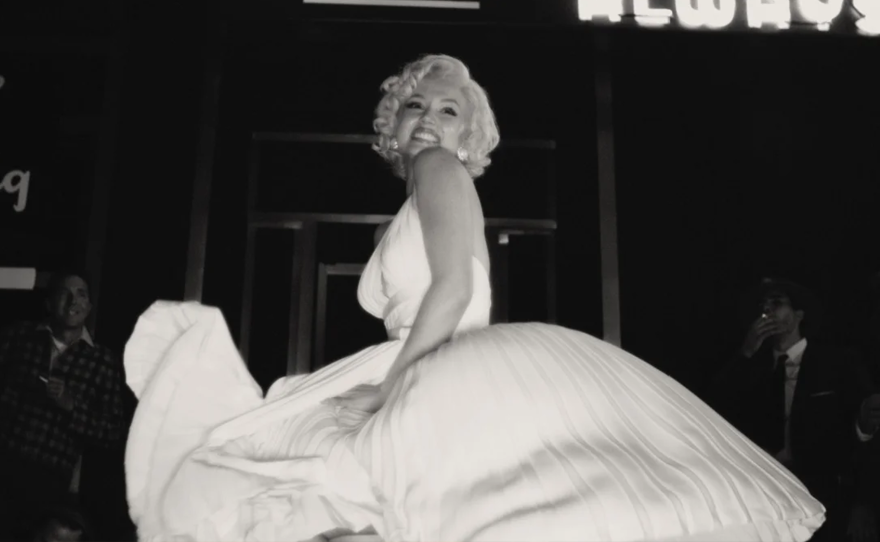Rarely have I had to put more distance between me and a movie’s subject, or between a film and its own director, than I did when I was watching the Marilyn Monroe quasi-biopic Blonde. When I’m successful in creating that distance, the movie is kind of remarkable. And when I’m not, the movie is kind of reprehensible.
Both this film and the Joyce Carol Oates novel it’s based on are put forth as fictional versions of Monroe’s life, and if we start there, some distance is easier. Because we cannot regard this Marilyn as anything like a real person if we’re going to survive the movie emotionally, or if we’re going to come out of the film feeling anything but contempt for its creators. Blonde follows Marilyn, or Norma Jeane as she’s more often called here, from her early life with a violent, unstable mother, through her stardom, and to her early death from a drug overdose. And throughout, we see her subjected to cruelty from those around her—mostly men, though not entirely. Sexual cruelty, physical violence, psychological and emotional assaults. Director Andrew Dominik does an astonishing job recreating many, many iconic pieces of Monroe’s public life—scenes from films nearly everyone knows, photos from magazine spreads, all of it framed and lit to painstaking perfection, forcing us to observe this Marilyn that we definitely do know.
But, then, that Marilyn doesn’t actually exist. And, it turns out, neither does Norma Jeane. Because this is not just a fictional version of Marilyn Monroe’s life, it’s an existential horror movie. This is not Norma Jeane wishing she could break free from her public persona and be herself, because there is no “herself.” Norma Jeane is just a shell, all that exists is what we, outside of her, know and create. It’s a vicious paradox, in that Norma Jeane essentially knows she doesn’t exist. She has no agency and no identity—she once tries to assert something like that, insisting that “I’ve changed my mind, my mind’s my own to change,” but we know that’s not true. And in a way, Dominik indicts us, the audience, as we’re the ones who want Marilyn—but even worse, we’re also the ones who want to “save” Norma Jeane from her torment, and this becomes a kind of rescue fantasy for us, which is an enormously distasteful way to react to something like this.
Dominik’s work is magnificent to look at, if chaotic—the movie is beautiful, shifting film stocks, lenses, and aspect ratios seemingly on a whim, and often not necessarily following a linear narrative. It plunges us into this world and keeps us there for nearly three hours. It’s also excruciating, even physically painful to watch at times, especially when it’s dealing with Norma Jeane’s pregnancies and what turns out to be a forced abortion. It tears us wide open emotionally, and one point-of-view shot makes it abundantly clear that what we’re seeing is horror.
Andrew Dominik has often been interested in the public perception of celebrity, and rather than undermining that, he tends to push even harder into what that perception is. And we have to see Blonde in this way if we’re going to have any personal success with it, because this is not a movie about a real person’s trauma or the legacy of that, and it’s not about a woman trying to survive in a violent, male-dominated world—it’s not actually interested in those social issues, or really even about Monroe as a human being. It wants to shove a stick into our eyes as we regard this “Marilyn Monroe” we desire and this “Norma Jeane” we want to save. For her part, Ana de Armas is staggering as Marilyn and Norma Jeane, on screen for nearly the entire running time and punished in so, so many ways. It’s a feat of endurance that she nails at almost every turn, no matter what’s thrown at her.
Should we watch Blonde with this kind of distance? I can’t answer that, but plenty of people have made strong cases that Dominik is visiting even more cruelty on a person who very much was not fictional, and some seemingly obtuse comments by Dominik himself make it appear he may actually be interested in less than I’m giving the movie credit for here. But art leaves the possession of the artist as soon as it’s released into the world, and so if we distance ourselves from Dominik, too, we can let the film unfold. Blonde is an extraordinary film to watch, but it’s very difficult to get there, and it may not be a place you want to go.
Blonde is on Netflix.



